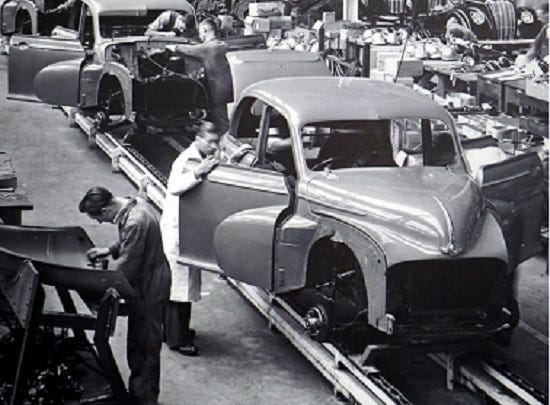AI Helping to Fuel Boom in Manufacturing
AI underlies a range of new factory tech including advanced robotics, equipment monitoring, decision-making systems and digital twins; HPE demos at Hannover Fair
By John P. Desmond, Editor, AI in Business

Today’s factories are becoming much more technically advanced, with AI at the forefront of a technology mix that includes digital twins, data platforms, edge devices to the cloud, robots and many, many sensors.
“These technologies support fully automated, ‘dark’ plants, automated decision-making, enhanced equipment monitoring, and new production networks with recycling and upcycling capabilities,” stated Goetz Erhardt, Europe lead for Accenture’s digital engineering and manufacturing division, in a recent account from CNBC.
Robotic arms that can add and remove materials, perform welding and place goods on pallets are now a common sight in factories, from automobiles to food processing plants. The addition of more advanced AI can shake up the mix further, including conversational systems such as ChatGPT, which integrated into robotics, for example, could enable more sophisticated machines.
“Generative AI has enormous potential in manufacturing for equipment optimization, interaction and intelligence -- from robotic processes through to machining,” stated Simon Floyd, director of manufacturing and transportation industries at Google Cloud.
Google recently started offering new services for manufacturers via its cloud platform, aimed at pulling data from machines and detecting deviations in production operations. Going forward, AI will be able to “converse using natural language with manufacturing equipment,” Floyd stated.
Generative AI is destined to have a role in manufacturing automation, such as by generating content “for many types of manufacturing equipment, ranging from specific repair instructions to software code that is tailored to a specific asset,” Floyd stated.
The creation of “digital twins,” 3D digital replicas of objects and systems in the physical world that behave and look like their real-world counterparts, is being tried in advanced manufacturing companies. This includes Rolls Royce, whose engineers create precise virtual copies of its jet engines, which can be updated in real time using sensors on working engines in service.
“Imagine that for every modern Rolls Royce jet engine up on a plane in the sky, there’s one in the cybersphere that needs to be maintained, working out how much stress is going through the plane. That will depend on how the engine is faring in the atmospheric conditions and pressures in the air,” stated John Hill, CEO of Silico AI, a startup that focuses on digital twins for business processes.”
Factory AI on Display at Hannover Fair
At the Hannover trade fair held recently in Hannover, Germany, the potential for AI in the manufacturing sector was a firm focus. More than 4,000 exhibitors and 130,000 visitors from around the world attended.
In one example, an employee of American IT services provider HPE chatted with an AI-enabled virtual assistant, asking it to operate the arm of a robot. “Factory workers no longer need to get a qualified expert on site: the artificial intelligence takes charge” of guiding the repairs, stated Thomas Meier, a data analyst from HPE who was presenting the prototype, according to an account in EconomicTimes.
HPE, with 60,000 employees, has been working with Aleph Alpha, a German startup with some 50 staff, positioning as a European rival to OpenAI. The German startup says it has the advantage of being able to keep its customer data within European borders. CEO Jonas Andrulis stated that Europe’s contribution to the AI revolution must go “beyond regulation.”
He sought to dampen fears that AI is a threat to workers. “It’s not like AI will take your job,” he stated. “But the company who will use AI will take the market share of the company who doesn’t.”
On its website, Aleph Alpha promoted “explainable and trustworthy AI” that is able to trace the factual correctness of its language models on the basis of “verified facts,” stating, “This is a breakthrough in the field of transparency and explainability of large AI language models.” Processing all customer data in high-performance AI clusters in Germany, enables the company to comply with European regulations for data security.
AI in Position to Augment Existing Workforce
The manufacturing industry is challenged by a shortage of skilled workers that AI is seen as able to help by augmenting the workforce. While many manufacturing companies have piloted advanced technologies in the past decade, they have been challenged to scale the technology to achieve the highest value. And, “few companies have invested in self-controlled systems based on AI. This has the potential to unlock far more value,” stated Francisco Betti, head of the Global Industries team for the World Economic Forum, which recently published an account on the topic.
“AI can help to address manufacturers’ capability challenges and talent shortages,” stated Betti. AI can do this by allowing business to automate monotonous, repetitive tasks and augment and support employees in their daily work, such as through human-robot collaboration.
The potential is high. “We have yet to fully grasp the possibilities for applying AI in the industrial context,” he stated. The biggest hurdle is scaling AI pilot applications to get their full benefit. What is missing is, “a set of general guidelines on how to manage the implementation of AI at scale,” Betti stated.
The World Economic Forum has recently begun collaborating with the Boston Consulting Group to launch a new global initiative, called AI-powered Industrial Operations.
“The aims are: to raise awareness on the opportunity offered by AI applications; to outline the most-promising AI applications and required implementation prerequisites; to develop an educational guidebook on how to implement and scale AI in industrial operations,” according to the WEF account, which was co-authored by Daniel Kuepper, a BCG managing director and partner based in Cologne, Germany. As part of the effort, the companies plan demonstrations of the impact of AI through pilot projects run across its networks.
Read the source articles and information from CNBC, in EconomicTimes and from the World Economic Forum.
(Write to the editor here; tell him what AI topic you want to read about in this newsletter.)




